Books by Matt Sleat
Table of Contents
(Columbia: Columbia University Press, 2018)
Published and Forthcoming Papers by Matt Sleat
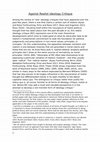
Social Philosophy and Policy, 2024
Among the variety of 'new' ideology critiques that have appeared over the past few years, there i... more Among the variety of 'new' ideology critiques that have appeared over the past few years, there is one that claims a certain sort of realism (Aytac and Rossi Forthcoming; Prinz and Rossi 2017; Rossi and Argenton 2021; Rossi 2024). 1 Situating itself within the resurgence of realist political thought that has taken place over the past decade or so, this realist ideology critique (RIC) represents one of the main theoretical developments which aims to make good on what its advocates take to be realism's fundamental commitment to seek the foundation for political judgements and prescriptions in non-moral values, principles, or concepts. 2 On this understanding, the opposition between moralism and realism is one between theories that are grounded in moral claims and those that are not. As Enzo Rossi puts it, realists believe 'properly political principles don't draw on the same sources of normativity as moral principles' (2019, 640). 3 Advocates of RIC often take themselves to be espousing a particular variation of realism, however-one they usually label 'radical'.
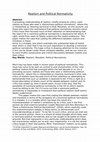
A prevailing understanding of realism, chiefly among its critics, casts realists as those who see... more A prevailing understanding of realism, chiefly among its critics, casts realists as those who seek a 'distinctively political normativity', where this is interpreted as meaning nonmoral in kind. Moralists, on this account, are those who reject this and believe that political normativity remains moral. Critics have then focused much of their attention on demonstrating that the search for a nonmoral political normativity is doomed to fail which, if right, would then seem to fatally undermine the realist endeavour. This paper makes the case that casting the difference between realism and moralism in these terms is a mistake, one which overlooks the substantial body of realist work which is clear that it has no such aspirations to develop a nonmoral political normativity. The hope is that in drawing attention to this mistake a line can be drawn under these unhelpful debates, and we can move on to more fruitful constructive and critical discussions between realists and their critics.

European Journal of Philosophy, 2021
Contemporary political discourse is awash with concerns about truthfulness, understood as the vir... more Contemporary political discourse is awash with concerns about truthfulness, understood as the virtue of making sure that our beliefs are true, in political life. The central argument of this paper is that it is not only possible for us to be self-deceived as to our own truthfulness but that there is good reason to suspect certain aspects of the way we understand and value truthfulness make it something which we may be particularly prone to being self-deceived about. If that is correct, then not only do we have further reason for thinking that self-deception in politics may be more common than we might like to think, it also (a) helps us understand why claims about truthfulness seem more likely to perpetuate and intensify conflicts in politics; (b) suggests that the possibility of our being self-deceived about our truthfulness stands sufficiently independent of our first- order beliefs, be they true or false, such that it is likely to appear across the various political divides rather than being exclusive to one group; and (c) requires us to reconsider the problem represented by “post-truth” politics and the responses that might be appropriate to it.
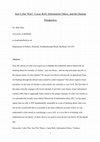
Does the advent of cyber-war require us to abandon the traditional ethical framework for thinking... more Does the advent of cyber-war require us to abandon the traditional ethical framework for thinking about the morality of warfare - just war theory - and develop principles specific to the unique nature of cyber-attacks? Or can just war theory still provide an appropriate basis for thinking through the ethical issues raised by cyber-weapons? This article explores these questions via the issue of whether a cyber-attack can constitute a casus belli. The first half of the paper critically engages with recent attempts to provide a new theory of just information warfare (JIW) that is supposedly better suited to the unique character of cyber war insofar as it is grounded the broader meta-ethical framework of information ethics (IE). Yet the paper argues that not only is JIW fundamentally unsuitable as a way of thinking about cyber-war, but (in the second half) that it is possible to develop a different account of how we can understand a cyber-attack as constituting a casus belli in a way that is in keeping with traditional just war theory. In short, there is no need to reinvent just war theory for the digital age.
This is the introduction for the edited collection 'Politics Recovered: Realist Thought in Theory... more This is the introduction for the edited collection 'Politics Recovered: Realist Thought in Theory and Practice' forthcoming with Columbia University Press. Contributors include Duncan Bell (Cambridge), Richard Bellamy (UCL), Elizabeth Frazer (Oxford), Michael Freeden (Oxford), William Galston (Brookings Institute), Charles Larmore (Brown), Alison McQueen (Stanford), Glen Newey (Leiden), David Owen (Southampton), Mark Philp (Warwick), Paul Sagar (Cambridge), Rahul Sagar (Princeton), and William Scheuerman (Indiana)

A common trait of all realistic political theories is the rejection of a conception of political ... more A common trait of all realistic political theories is the rejection of a conception of political theory as applied moral philosophy and an attempt to preserve some form of distinctively political thinking. Yet the reasons for favouring such an account of political theory can vary, a point that has often been overlooked in recent discussions by realism's friends and critics alike. While a picture of realism as first-and-foremost an attempt to develop a more practical political theory which does not reduce morality to politics is often cited, in this paper we present an alternative understanding in which the motivation to embrace realism is grounded in a set of critiques of or attitudes towards moral philosophy which then feed into a series of political positions. Political realism, in this account, is driven by a set of philosophical concerns about the nature of ethics and the place of ethical thinking in our lives. We argue that this impulse is precisely what motivated Bernard Williams and Raymond Geuss to their versions of distinctively realist political thought. This is important to emphasise, we argue, as it demonstrates that realism does not set politics against ethics (a misunderstanding typically endorsed by realism's critics) but is rather an attempt to philosophise about politics without relying on understandings of morality which we have little reason to endorse.
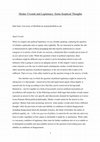
When we enquire into political legitimacy we are, broadly speaking, exploring the question of whe... more When we enquire into political legitimacy we are, broadly speaking, exploring the question of whether a particular ruler or regime rules rightfully. We are interested in whether the rule is characterised by right (without prejudging that that need be understood as a moral category) or is merely a form of rule via coercion, a distinction that is usually put in terms of de jure and de facto order. While this question is basic to political experience, there nevertheless might be different ways in which it can be formulated which in turn will influence what is going to count as an adequate answer. In this chapter I want to express some concerns as to the way in which much contemporary modus vivendi theories have either raised the question of political legitimacy or the sort of answer that it takes to be sufficient. That is to say, it has either tended to get the question wrong or the answer, or both.
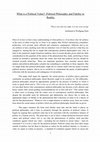
This paper seeks to defend the claim that political philosophy ought to be appropriately guided b... more This paper seeks to defend the claim that political philosophy ought to be appropriately guided by the phenomenon of politics that it seeks to both offer a theory of and, especially in its normative guise, offer a theory for. It does this primarily through the question of political values. It begins by arguing that for any value to qualify as a value for the political domain it has to be intelligible in relation to the constitutive features of politics as a human activity. The following section then examines the extent to which the preconditions for the realisation of values in practice ought to figure in our considerations as to whether they are values that fit or belong to our social world. We can understand these sections as responding to two related questions, respectively: 'is this a political value at all?' which is to say, is it a value that is appropriate for the political realm, and then 'is this a political value for us?'. The final section responds to the often-made complaint that political philosophy ought not to make any concessions to the actual world of politics as it really is, arguing that attending to the realities of politics, and in particular the constitutive conditions of political activity, gives meaning to the enterprise as the theorisation of politics (and not something else). Furthermore those same conditions provide the limits of intelligibility beyond which ideals and values can no longer be, in any meaningful sense, ideals and values for the political sphere.
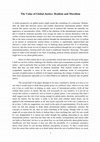
It is a noticeable feature of the contemporary revival of interest in realist political thought t... more It is a noticeable feature of the contemporary revival of interest in realist political thought that it has very much hesitated from exploring its implications for international political theory. This is interesting both because realism is one of the dominant intellectual traditions in international relations, but also as much of the recent debates surrounding global justice have engaged with themes that are at least germane to those of realism. This paper will therefore try and extend some of the themes of realist political thought into the realm of global justice. While there might be several areas worth exploring, the focus here shall be on the realist emphasis on making sense of politics as a sphere of activity that has internal sources of normativity which cannot be reduced to moral first principles, the relationship between politics and legitimacy, and how these pose fundamental questions for the political nature of global justice. It ends by arguing that, viewed through the realist lens, the question of the legitimacy of international institutions should take greater priority in global justice debates insofar as this is fundamental to enabling us to understand justice in political and not exclusively moral terms.
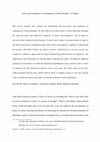
Social Theory and Practice, 42:2 (2015), pp. 230-52
This article explores and critiques the relationship between justice and legitimacy in contempora... more This article explores and critiques the relationship between justice and legitimacy in contemporary liberal thought. The first half sets out the extent to which liberalism denies that justice and legitimacy are distinct concepts, and criticises it on that basis. It then seeks to offer an interpretation of some of the deeper theoretical assumptions that result in this unsatisfactory conflation, arguing that the primacy that liberal theory has given to justice, understood as a moral concept, has resulted in a failure to appreciate the deeply multifaceted political nature of legitimacy. The suggestion is then made that it is only through recognising this nature, including the different (political) circumstances in which the demand for legitimation arises and the needs to which it responds, that this theoretical impasse can be overcome. The article ends on the more radical thought that this may require liberal theory to displace justice as the first (moral) virtue of political systems and replace it with the (political) virtue of legitimacy.
Juncture, 21:4 (2015), pp. 305-10
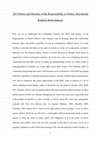
This paper offers a new approach to thinking about the ethics and politics of the Responsibility ... more This paper offers a new approach to thinking about the ethics and politics of the Responsibility to Protect (RtoP): It grounds the RtoP in a understanding of politics that recognises the specificity of the political, including its own internal sources of normativity, while also appreciating the plethora of ways in which morality features in political life. What emerges is a way of making sense of the RtoP in distinctively political terms - not as the attempt to put some universal moral project into practice, but as concrete responses to specifically political problems employing legitimate authority and power - but which must draw upon moral values (of humanity) in order to legitimate interventions. This view has the advantage of overcoming the realist/liberal dichotomy by enabling us to see morality as not prior to or having antecedent authority over politics, yet as nevertheless an integral part of politics vital to achieving a complete understanding of the RtoP.

Political Studies (forthcoming)
The charge that contemporary political theory has lost touch with the realities of politics is co... more The charge that contemporary political theory has lost touch with the realities of politics is common to both the recent ideal/non-ideal theory debate and the revival of interest in realist thought. However a tendency has arisen to subsume political realism within the ideal/non-ideal theory debate, or to elide realism with non-ideal theorising. This paper argues that this is a mistake. The ideal/non-ideal theory discussion is a methodological debate that takes place within the framework of liberal theory. Realism, contrary to several interpretations, is a distinct and competing conception of politics in its own right that stands in contrast to that of liberal theory and its ambitions. While the two debates are united in a sense that contemporary liberal theory needs to be more realistic, they differ significantly in both what this critique amounts to and, more importantly, what it is to do more realistic political theory.

Philosophy Compass
This paper provides a critical overview of the realist current in contemporary political philosop... more This paper provides a critical overview of the realist current in contemporary political philosophy. We define political realism on the basis of its attempt to give varying degrees of autonomy to politics as a sphere of human activity, in large part through its exploration of the sources of normativity appropriate for the political, and so distinguish sharply between political realism and non-ideal theory. We then identify and discuss four key arguments advanced by political realists: from ideology, from the relationship of ethics to politics, from the priority of legitimacy over justice, and from the nature of political judgment. Next, we ask to what extent realism is a methodological approach as opposed to a substantive political position, and so discuss the relationship between realism and a few such positions. We close by pointing out the links between contemporary realism and the realist strand that runs through much of the history of Western political thought.
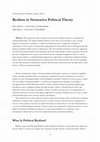
Philosophy Compass, 2014
This paper provides a critical overview of the realist current in contemporary political philosop... more This paper provides a critical overview of the realist current in contemporary political philosophy. We define political realism on the basis of its attempt to give varying degrees of autonomy to politics as a sphere of human activity, in large part through its exploration of the sources of normativity appropriate for the political, and so distinguish sharply between political realism and non-ideal theory. We then identify and discuss four key arguments advanced by political realists: from ideology, from the relationship of ethics to politics, from the priority of legitimacy over justice, and from the nature of political judgment. Next, we ask to what extent realism is a methodological approach as opposed to a substantive political position, and so discuss the relationship between realism and a few such positions. We close by pointing out the links between contemporary realism and the realist strand that runs through much of the history of Western political thought.

Political Theory, 42:3 (2014)
What, if anything, can realism say about the normative conditions of political legitimacy? Must a... more What, if anything, can realism say about the normative conditions of political legitimacy? Must a realist political theory accept that the ability to successfully employ coercive power in order to ensure compliance is equivalent to the right to rule, or can it incorporate normative criteria for legitimacy but without collapsing into a form of moralism? While critics argue that realism fails to adequately differentiate itself from moralism or that it cannot coherently appeal to normative values so as to distinguish might from right, this paper seeks to help develop a realist account of legitimacy by showing how it can successfully and stably occupy this position between moralism and Realpolitik. Through this discussion, however, the paper also argues that political rule necessitates the use of coercive power which is (at best) imperfectly legitimated, and that this blurs the distinction between politics and successful domination which lies at the heart of many recent accounts of political realism. In at least this sense, realism retains important and underacknowledged affinities to Realpolitik.

European Journal of Political Theory, 12:4 (2013), 347-67
The central contention of this paper is that contemporary liberal theory is without an account of... more The central contention of this paper is that contemporary liberal theory is without an account of what legitimates coercing those who reject liberalism that is consistent with its own stipulations of the conditions of political legitimacy. After exploring the nature of the liberal principle of legitimacy, and in particular how it is intended to function as a way of protecting individuals from domination and oppression by reconciling freedom and public law, the paper considers five different possible accounts of what might legitimate coercing non-liberals. While some of them have independent plausibility, the paper argues that none of them are consistent with the liberal understanding of legitimacy. The final section of the paper considers the implications of this theoretical gap for liberal theory more widely. The argument is made that liberalism must accept that even liberal politics requires the oppressive use of coercive power, i.e. compelling people to live according to wills other than their own, and that insofar as this is a position central to the recent burgeoning literature on political realism, liberalism ought therefore to be more realist.

Contemporary Politics, 19:2 (2013), 131-145
Disappointment is a familiar experience of political life and often blame is rightly attributed t... more Disappointment is a familiar experience of political life and often blame is rightly attributed to the failures of our politicians or the political system. The aim of this paper, however, is to provide a view on disappointment in politics that draws upon the recent resurgence of interest in realist thought insofar as it takes disappointment to be an inevitable feature of politics because of limitations and constraints that are intrinsic to the political sphere. With this in mind the paper explores some of the ways in which political conflict unavoidably generates disappointment, how it shapes the specific manner in which its corollary of hope and the discourse of hope operates in the political sphere, and how disappointment relates to questions of political unity. Appreciating the inevitability of disappointment should both help overcome some of the prevalent illusions regarding political possibility, as well as calm our discontent with politics by adapting our expectations and assessment of political life accordingly.











Uploads
Books by Matt Sleat
Published and Forthcoming Papers by Matt Sleat